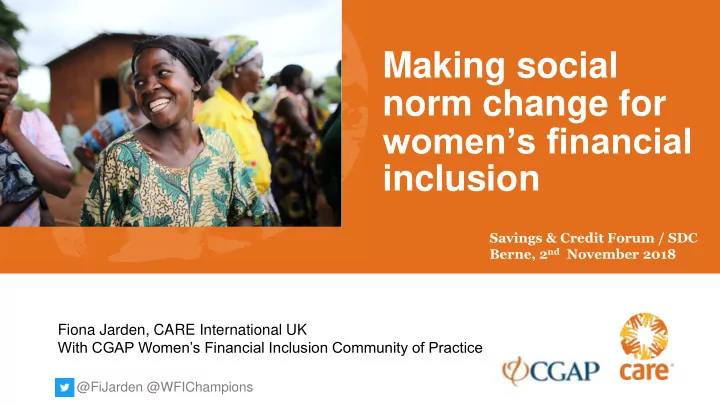

Making social norm change for women’s financial inclusion Savings & Credit Forum / SDC Berne, 2 nd November 2018 Fiona Jarden, CARE International UK With CGAP Women’s Financial Inclusion Community of Practice @FiJarden @WFIChampions
What are social norms? Waiting for your turn Social norm are: We wait our turn because others do … and because it is expected; o Shared expectations, others would disapprove of constructed by a group cutting in line o With consequences o They tend not to change quickly 1
Why do social norms matter for women’s financial inclusion? While social norms can be empowering, regressive norms tend to exacerbate the barriers for women to access and use financial services. These can have impacts on women’s mobility, unpaid care work, control over resources and assets ‘“Young girls get misguided [with cellphones]. It can break families and ruin relationships… Why do girls need [a] cellphone? The Internet is a waste of time and money for a middleclass community like us. Girls should better utilise their time for study and other works.” — village elder, Gujarat (CGAP case example) 2
CAREs approach to financial inclusion and gender equality i.e. access to savings & credit, education, i.e. ability to mobility in public negotiate spaces, household decision making i.e. social norms that dictate who gets access to assets (mobile, bank account) and resources (income), laws ‘Norm aware’ versus ‘norm transformative’ 3
CARE Case study 1: Indashyikirwa in Rwanda Approach Findings: major reduction in gender based violence At individual and household level: Women, any intimate partner violence ✓ increased savings 60 1.2 ✓ loans/investments ++ + ✓ financial literacy 50 1 ✓ solidarity ✓ linkage with formal finance 40 0.8 Through: Village Savings and Loan 30 0.6 Associations Tackling norms head on at household and 20 0.4 community level: 10 0.2 ✓ Couples curriculum ✓ Activist training 0 0 ✓ Engaging community Women, baseline Women, midline Women, endline leaders control intervention impact? ✓ Women’s spaces 4 Learnings available https://insights.careinternational.org.uk
CARE Case study 2: Digital Sub ‐ Wallets Village Women’s Household Savings and Mobile-sub- dialogues and financial Loan wallet banking counselling autonomy Associations 5
CARE Case study learnings ✓ Evidence shows VSLA are an effective platform to leverage and address wider social norm issues ✓ Pathway to formal financial inclusion ‒ 1.3million members linked to formal financial service providers ‒ Average VSLA member saves US $58 per year, and once linked to a bank the average savings per member increases by between 40 and 100 per cent. ‒ Members: Increased safety and security; higher rate of savings; women 38% more likely to take a loan on their own, improved group cohesion, opened more individual accounts at higher rates, report greater decision making power in the home ‒ Banks: Trained VSLA members mobilise deposits, open multiple accounts and pilots show default rate is less than 1% 6
Case study 3: BSR’s HERProject Digital Wages programme • By converting wage payments from cash to digital in the garment sector, we can close the financial inclusion gap for millions of low-income workers, especially women, who make up the majority of garment workers • 280 million adults globally receive their private sector wages in cash The approach: • In Bangladesh BSR and the Bill and Melinda Gates Foundation are supporting 68 factories, with over 150,000 workers (1/3 paid through digital wages), to transition from cash to digital wages through the HERProject Digital Wages Programme • Programme elements: Workplace training (for workers and managers) + support to transition from cash to digital 7
Case study 3: BSR’s HERProject Digital Wages programme Results and insights: • an 86% increase in mobile money ownership by women • women are 15% more likely to participate in household decisions related to spending and saving after completing the HERfinance Digital Wages program • clear business benefits to the factories and BSR has seen a 53% reduction in the admin time and effort on payroll. • Mobile money is an entry point to further financial inclusion – such as savings and remittances • Empowering women through digital wages shows promise, but will take time For more info contact emoffat@bsr.org 8
Case study 4: GRID Impact work in Pakistan to bring women into financial inclusion (COP member) Approach: 1. Design a smartphone app that created opportunities for women to overcome barriers to entry but didn’t exclude men 2. The design included an onboarding learning experience design for low income women that showed a woman in her home using mobile money for a variety of reasons and purposes. 3. The idea is that we created a new social norm of women using mobile money independently in the privacy of her home For more info: alex@gridimpact.org 9
Reflections on the journey making social norm change ✓ Traditionally most approaches focus on product development and roll out ✓ But increasingly, actors are beginning to take social norms into account ✓ If you can’t be Norm Transformative, be Norm aware in your approach ✓ It’s a growing area of understanding/literature – still a lot to learn! ✓ To take action: 1. Join the CGAP Women’s Financial Inclusion Community of Practice 2. Engage in the Social Norm Change Working Group 3. Inform the COPs agenda: What would you like to learn or know more about in terms of Social Norms? 10 10
CGAP Women’s Financial Inclusion Community of Practice 900 members, 350 organisations, 57 countries 11 11
A learning exchange platform • knowledge platforms, highlight good practices, Share explore opportunities for new partnerships • Working Groups facilitate technical discussions Collaborate addressing challenges and reducing duplication • Through virtual and face to face learning events we help Create members build on existing knowledge and connect learning t Data and Social Norms Technology . Three working groups: Measurement 12 12
Join us! http://www.findevgateway.org/organization/womens- financial-inclusion-community-practice 13 13
Keep in touch Fiona Jarden: Jarden@careinternational.org Nisha Singh: nsingh8@worldbank.org (community of practice) 14 14
Recommend
More recommend